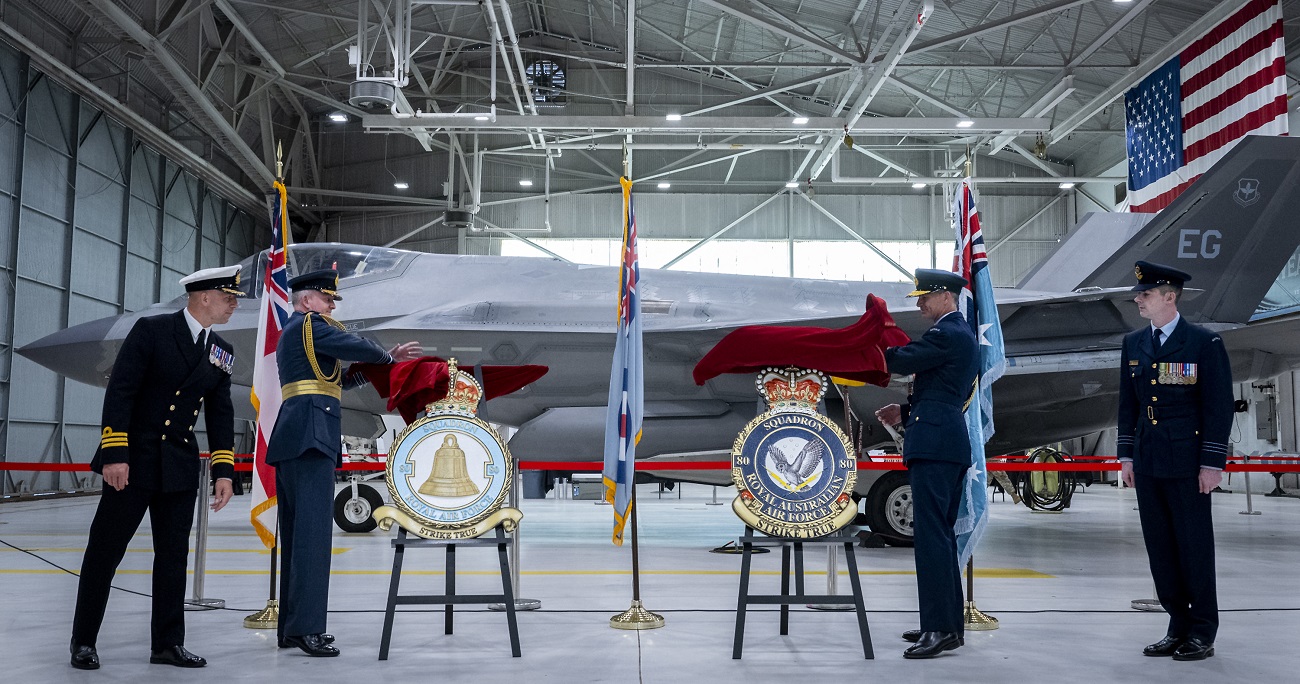Two units who work closely together, the Royal Air Force and the Royal Australian Air Force, have both been allocated the same squadron numberplate in a joint parade and naming ceremony at Eglin Air Force Base, Florida. At the event the Chief of the Air Staff, Sir Rich Knighton, and Chief of the Air Force Air Marshal Robert Chipman, formally awarded the dormant 80 Squadron numberplates for each service to their respective teams within the Australia, Canada and United Kingdom Reprogramming Laboratory. Known as the ACURL, the multi-million-dollar, joint military data centre is designed to give each country’s F-35 Lightning jets operational advantage in the most dangerous and demanding combat missions. In the Laboratory, highly trained specialists compile and test the Mission Data File Sets (MDFS) used on-board the fifth generation stealth fighter. The Mission Data File Sets (MDFS) fuses with information gathered by the aircraft’s own comprehensive integrated sensor package to show the pilot exactly the information needed to make the right decision in real time. The Royal Canadian Air Force will join 80 Squadron this summer as Canada prepares to receive its first F-35s in 2026.
“Our partnership with allied nations is of utmost importance. Together, we must adapt to meet the challenges of the future, by leveraging opportunities for collaboration and coorperation,” Air Marshal Chipman said.
“F-35 warfighting capability in Europe and the Indo Pacific is dependent on how well the specialist personnel at 80 Squadron continue to ‘sharpen the spear’ together in their work here in Florida. Co-location of the whole F-35 reprogramming enterprise at Eglin AFB provides a unique opportunity to integrate with our closest F-35 partners to the fullest extent, it’s an opportunity that wouldn’t exist if we were at home alone,” Air Chief Marshal Sir Rich Knighton said.

“80 Squadron provides a unique opportunity for overseas service for those in the Royal Air Force and the Royal Navy. It also offers the chance to work at the leading edge of software and data enabled weapons systems. Our success as a Squadron isn’t possible without the unwavering support of the US and the plethora of Eglin Air Force base stakeholders who will continue to support the Squadron and its outstanding capability. In our new facility opening later in 2024, we will be transforming the way we conduct mission data business through the introduction of enhanced software tools and innovative processes,” Commander Wilcox RN Officer Commanding 80 Squadron said.
80 Squadron is an Air & Space Warfare Centre Squadron, made up of aircrew, engineers, technicians and intelligence analysts, drawn from both the RAF and Royal Navy. Formed in 1917, 80 Squadron RAF has been stationed across the world. After service over the Western Front and then Egypt during the First World War, it reformed in 1937 and returned to North Africa. After service in the Eastern Mediterranean and Italy it returned to the UK in 1944 where 80 years ago it conducted fighter sweeps with Spitfires in preparation for D-Day. Re-equipped with Tempests it flew armed reconnaissance missions over the continent for the remainder of hostilities. Post-war it moved to Hong Kong and in 1955 it reformed in Germany with Canberra PR.7s which it operated until disbandment in 1969. The RAAF 80 Squadron formed in 1943 and fought throughout the war in the Pacific theatre. Equipped with the P-40 Warhawk operations including covering Allied amphibious landings. It disbanded in 1946.















